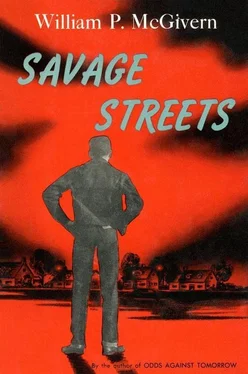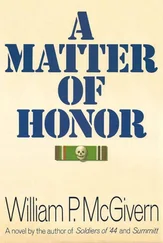“Who are you? What’s your name?”
“That doesn’t matter. I want to apologize, Cleo. I want to see you. Are... are you all right?”
“What do you mean, am I all right?”
He couldn’t interpret her mood from the tone of her voice; but she sounded more querulous than angry. “You know what I mean. I’m terribly sorry, Cleo.”
“That’s fine, that’s great. Everything is dandy now.”
“Please, please,” he said, whispering the words like prayers. “I want to see you. I swear before God I won’t bother you again. But I must see you. Are you alone?”
“My father’s here.”
“Did you tell him?”
“That’s for me to know and you to find out,” she said, but a thread of coquettish insinuation ran through the scorn in her voice; Norton felt himself tremble with hope.
“Don’t be like that, Cleo,” he said. The hope became stronger, exultant; they were discussing it like a pair of conspirators. “Can’t you slip out for a few minutes?” he said. “Will you try?”
“I’m not supposed to go out this late.”
“Say you’re going to borrow a book or something from a girl friend. You’ll only be gone a few minutes.”
She was silent and he heard the sibilance of her breath in his ear. A dismaying thought struck him: was she having the call traced? Signaling to her father, pointing frantically at the phone, telling him with silently straining lips who was on the line. The scene was garishly illuminated by the bursts of whiteness in his mind; he saw her crouched at the phone, the father large and angry, hurrying to a neighbor’s house to call the police.
“Cleo,” he said. “Trust me. Please.”
“I’m thinking. Do you know where Raynes Park is? There’s a statue in the middle of it, and some benches.”
“Will you meet me there?”
“If I can. If I’m not there in half an hour, it’s no use. My father’s pretty strict.”
“I don’t blame him.” The sense of relief was so great that Norton almost laughed aloud; the guilt and terror were draining from him like poisons, and in their place flowed the warm restoring balm of peace. “I’ll be waiting for you.”
“Don’t stand me up now.”
At that he did laugh, giddily but silently. “Not a chance. I’ll be there.”
When he replaced the receiver Norton sat perfectly still for half a minute. He was hot all over, his shirt sticking to his body with perspiration. How would he explain going out to Janey? The dog, of course. He went quietly upstairs and opened the door of their bedroom. The light was out and Janey’s body was a soft slight mound under the covers.
“Janey?”
She stirred and murmured sleepily, “Coming to bed?”
“I’m going to take Cinder for a walk.”
“All right, dear. Put on something warm.”
He closed the door and went to his son’s room. Cinder slept at the foot of Junior’s bed. “Come on, Cinder,” Norton said in an urgent little whisper. “Want to go for a walk?” Cinder, a glossy black dachshund, squirmed and leaped off the bed, crooning with excitement.
Norton picked her up and tucked her under his arm. “That’s a good dog,” he said. A bar of light fell across his son’s face. Norton looked at the sleeping boy for an instant, and the serenity in his face, so unknowing, so vulnerable, went through him like a knife. He knew intuitively that salvation was close at that instant; in his excitement he could imagine the drumming beat of wings, the appearance of soft, miraculous lights, but deliberately and ruthlessly he turned away from all this, closing the door and running quickly down the steps with the frantically squirming puppy in his arms.
The night was black and the yellow street lamps reached up and touched the low limbs of the trees with gold. There was a small soft wind and the only sound in the breathless silence was the occasional dry creak of a branch above his head; it was how the twist and strain of rigging would sound, he thought, canvas and ropes tightening powerfully against the massive press of great quiet winds. He had never sailed in his life, but he imagined a sailing ship would be like that on a calm night.
He put Cinder in the front seat and fastened her leash to the door handle. Without lights he moved carefully away from the curb, drifting in a closed dark silence along the block. The dog was puzzled; she whimpered and worried her leash. Norton patted her head and said, “It’s all right, old girl, we’re just taking a little ride.”
At the first intersection he snapped on the headlights and stepped hard on the accelerator. The forward thrust of the engine forced him back against the cushioned seat, and he sensed the power and urgency of the leaping car infusing his whole body. He felt giddy and weightless, but enormously strong; it was as if the machine were part of him, an extension of his energies, so that he had the sensation of hurling himself forward and being hurled forward at one and the same instant, a delirious balancing of the active and passive which canceled all responsibility and left him suspended in a vacuum of reckless, irrepressible excitement.
Raynes Park had been named for a suburb of London. The small holding of land had been left to the Township of Rosedale by a descendant of one of the original South Shore settlers, chiefly for tax purposes it was rumored, but ostensibly to commemorate the birthplace of the ancestor who had established the family’s fortune in America. It covered a half-dozen acres and was attractively landscaped with yew hedges and dwarf shrubbery. Graveled walks twisted through lawns and neat columns of poplars. In the central plaza iron benches were placed about a small pond, and here, in good weather, nurses and an occasional pipe-smoking old gentleman watched children sailing boats or wading in the warm green water.
Norton parked in the darkness a hundred feet from the entrance to the park. From where he sat hidden in the shadows of trees, he could see the pond shining faintly in lamplight. The benches around it were empty. Damn, damn, he thought. If she can’t make it...
If she came to him, he knew he would be saved. Free. But his fate hung on such whimsical threads. Her father’s mood. He might smile at her, not taking his eyes from the television, hardly hearing her question: “Okay, sure.” Or he might have had a bad day. A chewing-out from his boss. And take out his bitterness on her, exercising parental spleen to restore his ego. “No, and that’s final. Do you see the time? Do you think I want you running around the streets like a damned whore?”
Norton saw her then, walking slowly along a graveled pathway toward the plaza, her small figure moving through the symmetrical shadows cast by the tall poplars. She must have come in from the Hayrack side, he thought, watching as she sat down on an iron bench facing the pond. She was all alone in the park, her face a white blur in the pale lamplight and her body small and huddled beneath the arching limbs of the poplars.
Norton got out of his car and closed the door gently, the sound losing itself in a wind that whispered in the yew hedges. He stood in the protective darkness and watched her for several minutes. When it became apparent that she intended to wait for him some of his nervousness abated; he was by temperament and training a frugal, realistic man, and he knew that she would not be here unless she hoped to get something from him. It was the situation he faced every day in the loan department at the bank; people wanting something and prepared to bargain for it. In this case he didn’t feel like insisting on any particular terms or arrangements, but simple professional habit warned him to watch out for his own interests.
Norton walked into the park, his footsteps on the gravel loud and clear in the cold air. She turned toward the sound and when he emerged from the shadows she stood up and smoothed down her skirt with nervous little gestures.
Читать дальше












